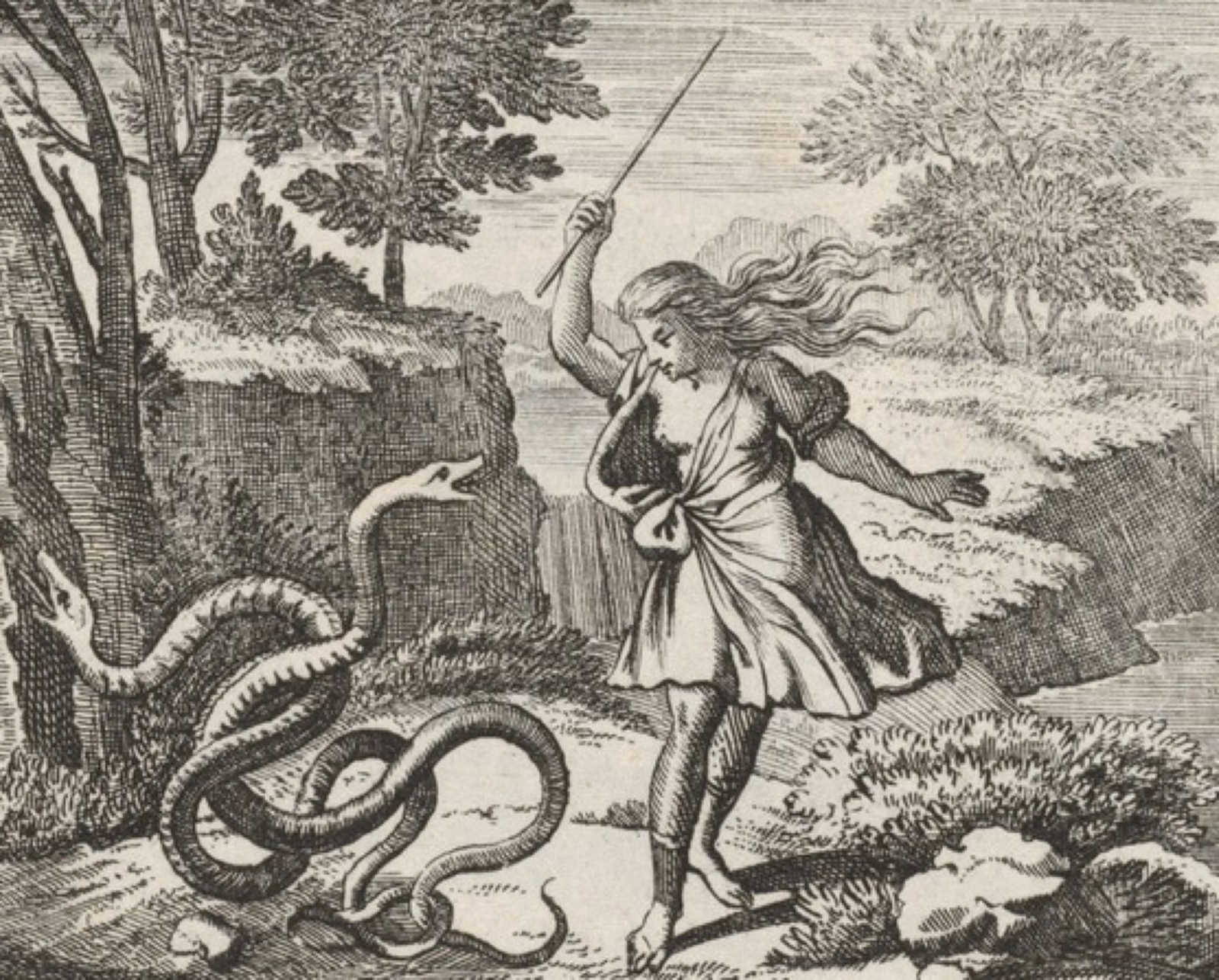Describe an important religious leader in your world. How has their character changed the status quo?
The Gender-Fluid Seer
As a young lad,
As a young maid,
The gender-fluid seer
Met a pair of snakes.
Tiresias lost their eyes
But expanded their wisdom.
They advised seven generations
Of Theban kings.
They provided marital therapy
To Zeus and Hera.
When Odysseus showed up
In the afterlife,
He found Tiresias counseling souls.
Tiresias fascinated the ancients.
Gender reassignment
For them,
Was a kind of magic
Or a gift from the gods.
For Tiresias,
A personal discovery,
A period of exploration,
And ultimately,
A choice.
Tiresias of Thebes
As the chief advisor to the Kings of Thebes, Tiresias was one of the best-known and longest-lived prophets in Greek mythology. Their rise to prominence and power came despite, or perhaps because of, their visual impairment and transgender identification. Gods came to Tiresias for advice. And even after their death, such was their reputation that heroes traveled to the Underworld to seek them out.A Gender-Fluid Life
Tiresias, as a boy, came across a pair of snakes in the road and hit them with a stick. Perhaps these were magical gender-changing snakes, or gods in disguise, or perhaps this incident triggered some innate power that had been within Tiresias all along. Given that snakes, serpents, and dragons often represent the acquisition of knowledge, perhaps the act of striking them was symbolic of the self-knowledge Tiresias obtained as a result. But no matter the cause, upon striking the snakes, Tiresias experienced an instant reassignment from male to female, and lived for a time afterward as a girl. Years later, as a grown woman, Tiresias came across that same pair of snakes again. This is a moment that bears some dissection. Their first encounter with the gender-swapping and/or knowledge-granting snakes was almost certainly a chance encounter, with Tiresias having no idea of the potential consequences. But at their second meeting, Tiresias knew exactly what these snakes could do. It's at this point that Tiresias, in a woman's body, expresses a male identity. They strike the snakes, in a deliberate act, making the affirmative choice to transition back to male. In all versions of the story, Tiresias transitions from male to female and back at least once. In some versions, they perform the feat multiple times. This expression of gender fluidity resonates with modern people as it must also have resonated with the ancients, in their own experiences with and contemplations of gender dysphoria. No classical story records Tiresias ever being bullied, stigmatized, or marginalized for their gender reassignments. They are accepted by their society whether as a male or as a female. They have relationships. As a woman, they marry a man and bear children. As a man, they marry a woman and father children. Their experience was regarded as a source of wonder, even by the gods.Marriage Counselor to the Gods
Having personally experienced both sides of a heterosexual relationship, Tiresias could empathize with both men and women, and was uniquely qualified to counsel couples through their marital difficulties. Their clients included Zeus and Hera, the divine rulers of the entire cosmos. In one session, Zeus and Hera were quarreling about whether it was better to be a man or to be a woman. To settle their dispute, the two gods demanded that Tiresias pick a side. To be clear, both of these gods had cosmic powers and well-documented anger management issues, and Tiresias was being asked to choose which of them to piss off. Tiresias sided with Zeus. Predictably, Hera invoked an irreversible curse. She declared that, to decide against her, Tiresias would have had to be blind, so she made sure Tiresias would never see again. To compensate for the curse of blindness, Zeus provided Tiresias with a different kind of vision. From then on, they would be able to see future events.Tiresias as Royal Seer
Tiresias was a friend and counselor to Cadmus, the founder of Thebes, and to seven generations of kings in the Cadmaean Dynasty. In this phase of their life, they were known for their wisdom as well as an ironic sense of humor. "I may be blind, your majesty, but you are the one who can't see the obvious," is what they said to a raging King Oedipus. Apparently, once a person stares down the ire of Hera, they no longer fear the wrath of mortal kings. While in residence at Thebes, Tiresias served as an attendant of the Temple of Apollo, the god of prophecy. Tiresias's apprentice was Manto, their daughter, although it's never stated whether Tiresias had been Manto's biological mother or her father. Manto would eventually outshine Tiresias as a seer, and would relocate to Delphi to serve as the Pythia. Tiresias was still performing their Theban duties when the Epigoni sacked the city. Tiresias fled with the survivors, saving as many as they could, and died in exile from self-inflicted poison, as they must always have known they would.Tiresias in the Afterlife
In Homer's Odyssey, the Achaean war hero Odysseus, on a journey home to Ithaca, angers Poseidon, the god of the sea. This is especially problematic because Odysseus's destination is an island surrounded by Poseidon's domain. Odysseus spends the next ten years wandering the Aegean Sea, shacking up with goddesses, and losing every single one of the soldiers under his command. His dilemma can only be solved by Tiresias, and since Tiresias is dead and buried, Odysseus travels to the Underworld to consult them. There's something extraordinary about Odysseus's encounter with Tiresias. The other shades in the afterlife have all forgotten their former lives, and must be prompted with a blood offering to remember anything, except for Tiresias. Tiresias alone remembers his past life, possibly due to all of those centuries spent in the Temple of Apollo, contemplating the famous motto: "Know Thyself." In the end, this gender-fluid seer who vacillated between male and female was seen by the ancients as one of the rare individuals who truly knew themselves. In this, Tiresias became the model of a self-examined life that all would be wise to follow.On This Page:
Elsewhere:
Join World Anvil to subscribe to updates.

Children
Gender
variable

This is my favourite article yet! It is absolutely fascinating!
Thanks. Glad you liked it.